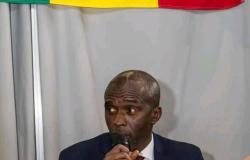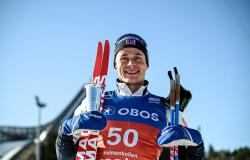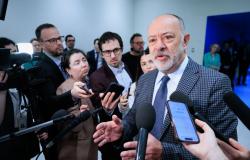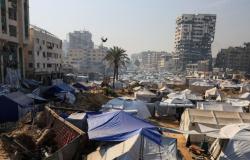The toxic hockey culture is at the heart of recent judicial cases such as the trial of the five players in the 2018 edition of team Canada Junior accused of collective rape and the conviction of Noah Corson to a prison sentence after being found guilty of sexual assault on a minor.
In order to reverse this culture of sexual violence, the Sport’aide organization has set up the program Tomorrow a man
which is offered in schools and the sports environment in the Quebec region.
The managing director Sylvain Croteau explains how it works during an interview carried out on Monday on the program Le 15-18 on the waves by first.
Q. I read a summary of what happened [lundi] In Ontario in the trial of former Canada Junior team hockey players. The alleged victim testified and said that she had the impression that everything was a joke for them. Does this sentence particularly resonate at home? What does she indicate about this culture that we describe as being so toxic?
A. These are behaviors that are unfortunately trivialized. In recent months, last years, we have been faced with this sad reality which ensures that there are young boys, young men, who find it normal to have behaviors as unacceptable as these.
We have also seen [lundi] The rendering of the sentence on the son of a former player of the Montreal Canadian [Noah Corson] And there too in the subject we excused, in quotes, almost the fact that the young man had probably been influenced by other remarks, where we trivialize in the locker room the behavior and the bad jokes with regard to young girls and young women. So this is what explains these behaviors that are completely unacceptable.
Hockey sexual assault: change toxic culture
ENGINE MAI FIRSTThe 15-18
Launch listening| 10 min
Q. In a report, we are told that this young man was exposed to questionable remarks with regard to women and distortions on sexuality. What do we know about these mechanisms?
A. These are phenomena, social behavior, and this is where there is a big problem. We must really bring our young boys, our young men, to realize that they do not have to follow the group and to adopt unacceptable behaviors of other boys, under the pretext that others do, others say, the others joke, so me too.
You really have to go against these behaviors. It requires a collective effort of society to bring our young boys to realize that it must cease, that these behaviors have no place, they have never had it, and even less today.
-Faced with this phenomenon that has occupied the news for several months, and a few years even, we have decided to look at the issue and set up a program that we are just piloting in schools and sports programs in the Quebec region and which is called Tomorrow a man
where we come to address and talk to young boys on positive behavior to adopt in a sporting context and also in society.
We come to become aware of the influence of standards in the adoption of certain behaviors from young boys, with the ultimate goal that we make good men because there are still. With the model exposed to us with these deplorable situations and gestures, it feels like men have suddenly become wolves in the sheepfold. There are still good men and there is always reason to hope that there are still full.
Q. Tell me more about this project Tomorrow a man
. Concretely, how can it work?
A. What we have done so far is to develop workshops, tools and activities to allow coaches and stakeholders, who rub shoulders with young boys, to act with them on behavior changes. We come to approach different themes. First, the introduction to our program Tomorrow a man
which allows an awareness of what it represents to be a guy in our society. What influences behaviors and attitudes adopted on a daily basis? What puts this pressure on guys to sometimes make bad choices? So, to question their beliefs, their opinions and the judgments they have.
We will also go on the prevention of violence. How, from discussions and activities, could athletes recognize behavior of violence? What do we do when we are a victim, when we are witness? Again, to avoid following negative models, bad influencers.
There are also group dynamics because that’s what it is about. We will approach with them the notion of positive leadership. As individuals and young boys in a group, how can we better understand the effect of standards in a team? What role to play in a team and differentiate the actions that are positive from those that are negative? This project is underway.
Q. How do we manage to measure this?
A. This is what we are currently working on. To see how we will measure and manage this experience. Already, the first reactions are very positive […] Young boys have reacted well so far, and their coaches too. I would even say that in places where we went, after our first visit, the young people were disappointed to know that a month or two was going to pass before we return to visit them.
On the calendar, this is on three or four different activities. After the first activity, the reactions we received was that It will be very long before you are seen again
. We had already aroused interest and curiosity.
Q. One of the key people is the coach. And especially if it comes from this culture. Do we have a job to do with adults who are in the room?
A. This is an important question. This is why we are seeing to develop mentoring also from positive models. There are already renowned, active or retired male athletes, who have agreed to work with us. So, for us to use, in quotes, their identity, their image and their words so that we present to coaches, current speakers and also young boys these positive models, that it exists.








